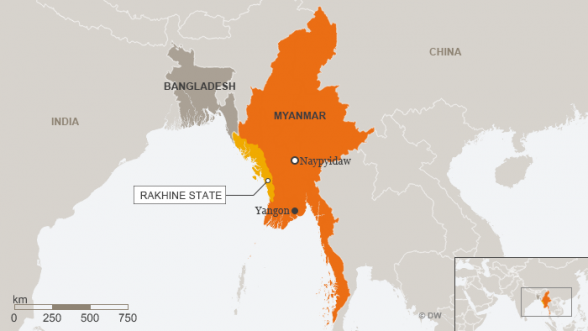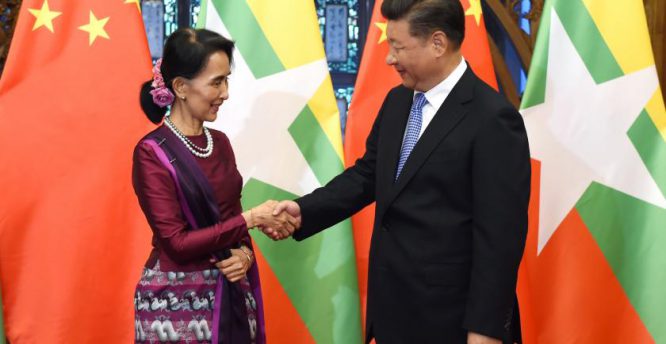By: Matteo Colorio & Feyga Saksonov
On September 6, 2018, Pre-Trial Chamber I of the International Criminal Court (ICC) ruled that the Court could exercise jurisdiction over the alleged deportation (as a crime against humanity) of the Rohingya people from Myanmar into Bangladesh, since one element of the crime (crossing a border) took place in Bangladesh, which is party to the Rome Statute.
To find out more about this Decision, read Part 1: Pre-Trial Chamber Grant Jurisdiction over Rohingya Deportation: One Step Closer to Accountability for these Atrocities and Part 2: Did the ICC Get it Right? A Look at the Decision to Establish ICC Jurisdiction in Myanmar.

This ruling led Prosecutor Fatou Bensouda to open a Preliminary Examination of the situation. During this stage, the Prosecutor will determine if the situation meets the legal criteria established by the Rome Statute for further investigation. Under article 51(1)(a)-(c), the Prosecutor must consider (1) jurisdiction (temporal, either territorial or personal, and material); (2) admissibility (complementarity and gravity); and (3) the interests of justice, as the OTP’s Policy Paper on Preliminary Examination describes it. The Preliminary Examination is now ongoing and the proceedings are still at an early pre-investigation phase, during which the Prosecutor does not enjoy investigative powers. This phase has been known to take from less than a week (Libya) to more than 14 years (Colombia).
If at the conclusion of the Preliminary Examination the Prosecutor believes there is a reasonable basis to proceed with an Investigation, she must seek authorization from the Pre-Trial Chamber, according to article 15 of the Statute. The Pre-Trial Chamber will grant authorization if (1) the Prosecutor provides a reasonable basis to believe that a crime within the jurisdiction of the ICC has been committed; (2) the Chamber is satisfied with the admissibility, and (3) the investigation would be not against the interest of justice (article 53 of the Statute of Rome). In light of the recent ruling, it is plausible that the Pre-Trial Chamber will grant this authorization when that time comes.
There are still several issues that may arise in this examination and subsequent investigation. These issues require a prompt solution to avoid serious roadblocks, such as the ones that obstructed progress in the situation concerning Kenya, the first in which the Prosecutor opened an investigation proprio motu rather than by receiving a referral. The Kenya case is at a standstill due to the failure by the Kenyan government to provide key evidence to the OTP and alleged bribery of witnesses.
Issues of what Crimes Can Be Charged at the Court:
The Pre-Trial Chamber I’s ruling suggested that crimes other than deportation may have been committed and may be within the jurisdiction of the Court (see paras. 74-79 of the Decision). As such, the Prosecutor must assess whether she can also proceed for the crimes of persecution (article 7(h)) and other inhumane acts (article 7(k)).
There is also the issue of genocide, which the U.N. Independent Fact Finding Mission found sufficient evidence to warrant an investigation into, but which is likely to be outside the jurisdiction of the Court.
Issues of Evidence:
The Prosecutor will probably face significant difficulties gathering evidence. The case will likely rely heavily on oral testimonies from the Rohingya refugees in Bangladesh, as Myanmar is unlikely to allow anyone from the ICC to gather evidence on their territory since it does not recognize the jurisdiction of the Court and has already refused access to the Independent Fact Finding Mission. While victim affidavits can be detailed and compelling, the case would be much stronger with comprehensive evidence that is only available from within Myanmar. Moreover, it is important that an Investigation starts without delay in order to be effective, since witness memories may weaken over time and witnesses who have suffered trauma may have difficulty providing comprehensive, accurate accounts.
The setting up of an independent evidence gathering mechanism similar to the International Impartial and Independent Mechanism (IIIM) for Syria could help mitigate these issues. Indeed, at the end of September 2018, the U.N. Human Rights Council did establish an equivalent, independent mechanism to address crimes committed in Myanmar through Resolution 39.2. This “ongoing independent mechanism” will:
“collect, consolidate, preserve and analyse evidence of the most serious international crimes and violations of international law committed in Myanmar since 2011, and to prepare files in order to facilitate and expedite fair and independent criminal proceedings, in accordance with international law standards, in national, regional or international courts or tribunals that have, or may in the future have, jurisdiction over these crimes, in accordance with international law.”
This work would complement that of the OTP and could be of paramount importance because it can store the evidence to be used in future proceedings at the ICC, or in domestic courts.

Members of the Fact-Finding Mission on the situation of the Rohingyas in Myanmar establish by the United Nations Human Rights Council
Problems Gaining Control over Defendants:
If the Pre-Trial Chamber grants authorization to open an Investigation, the Prosecutor will face the problem of bringing the suspects, many of whom are senior officials, to trial. The ICC does not have its own police force and, under Article 54 of the Statute, depends on the “cooperation and assistance” of States and international organizations.
Thus, the ICC must rely on States Parties to carry out its arrest warrants. Gaining control over an accused is even more difficult when the State hosting them disputes the jurisdiction of the Court. As a non-State party contesting the Court’s jurisdiction, Myanmar is unlikely to allow police forces from third States to enter in its territory to arrest senior generals of its security forces. Moreover, neighboring States whose help would be most important, such as India, China, Laos, and Thailand, are not bound to cooperate as non-State parties of the Statute.
According to Article 63 of the Statute, if the suspects are not arrested or do not appear at trial, legal submissions can be made, but hearings cannot begin. Thus, the Prosecutor’s proprio motu proceeding may well come to a standstill before the Trial stage even begins if the Court is unable to bring the suspects to The Hague.
Possible ‘Solutions’ to These Issues:
Article 13 of the Statute offers three options that could confer a stronger jurisdictional basis to the Court and as such, could be helpful in making the international community as a whole and individual States push Myanmar to allow the intervention of the ICC.
First, Bangladesh, as a State Party, could refer the situation to the Prosecutor. This depends exclusively on the discretion of the Bangladeshi government, which may be unlikely to bring this case as that would have adverse consequences for their relationships with neighboring countries. Furthermore, Bangladesh recently engaged in negotiations with representatives of Myanmar for the repatriation of thousands of Rohingya refugees, suggesting that the government prefers a bilateral approach to alleviate the burden of the refugees in its territory and as such, might be less willing to refer the situation.
Second, a group of States parties to the Rome Statute other than Bangladesh may refer the situation to the Prosecutor, pursuant to article 14 of the Statute. This occurred for the first time in September of 2018, when a group of six States referred the situation of Venezuela to the OTP. This referral would confer a stronger jurisdiction basis to the Prosecutor. However, in the case of Myanmar, no neighboring State other than Bangladesh is party to the Rome Statute. Thus, this referral wouldn’t directly involve States whose help is necessary to gather evidence and gain control over defendants. Moreover, a referral by a group of States will still limit the ICC’s jurisdiction to Bangladesh. Only a referral by the Security Council would extend the ICC’s jurisdiction to Myanmar. Nevertheless, a referral by a large group of States is more likely to push other States to cooperate.
Third, the UN Security Council could issue a referral acting under Chapter VII, as it did in 2005 for Darfur and in 2011 for Libya. A Security Council referral would automatically grant the ICC jurisdiction over Myanmar and enable the OTP to gather evidence and prosecute the perpetrators more efficiently, with the authority and potential enforcement power of the United Nations behind them. If, at that point, Myanmar still refuses to collaborate, the Security Council and other UN bodies may force them into compliance by imposing economic sanctions.

Chinese President Xi Jinping (R) meets with Myanmar’s State Counsellor Aung San Suu Kyi in Beijing, capital of China (© Rao Aimin/Xinhua)
However, a Security Council referral in this situation is unlikely. The People’s Republic of China, with its geopolitical interests in the region, would almost certainly veto such a Resolution and Russia has made it clear (including in an official statement at the U.N.) that it won’t be supporting referrals to the ICC any time soon.
Furthermore, in the light of the substantial failure of the previous referrals experts dispute the utility of this approach. Not a single individual for whom the ICC has issued an arrest warrant in Libya or Darfur has ever been convicted. Moreover, experts criticize the Council for its failure to provide funding to the Court. This is the result of the inclusion in the Security Council Resolutions of a clause that exempt the U.N. and the non-States party of the Rome Statute from contributing to the expenses of the OTP’s Investigation over the situations referred (see para. 7 for Darfur and para. 8 for Libya of the relevant resolutions)..
Conclusion:
The International Criminal Court should continue its work of gathering evidence on the alleged atrocities committed in Myanmar, and UN member states should continue to push for a Security Council referral. This will make the international community directly confront the gravity and scale of the crimes and could push the U.N. General Assembly to create an independent evidence gathering mechanism. As Prosecutor Fatou Bensouda said, “This is the least we owe to the victims.”
Read the final piece in this sereies: Part 4: Claiming Jurisdiction: Comparing the ICC Pre-Trial Chamber Decision Regarding Myanmar with Other Approaches.
This series was created and edited under the direction of Harris Institute Fellow Madaline George.
